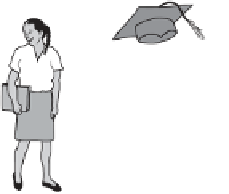Information Technology Reference
In-Depth Information
Code of ethics
Professional
society
Certification
Licensing
Skills
development
Professional
development
Accreditation
Education
FIGURE 9.1
A mature profession has eight attributes that enable it to certify new members
and support existing members [2].
in ensuring that fellow members of the profession are capable and act appropriately.
For mature professions, professional societies establish codes of ethics and require their
members to keep their knowledge current through continuing education and training.
Professionals who do not follow the code of ethics or fail to keep up with changes in the
field can lose their licenses.
To illustrate these steps, let's consider how a person becomes a certified public accoun-
tant (CPA). We choose accounting because it is a fully developed profession that does
not require graduate study for membership. In this respect it is more similar to a typ-
ical computer-related career than the medical or legal professions, which require their
members to earn advanced degrees.
The first step for someone wishing to become a CPA is to graduate with 150 semester
credit hours and at least a bachelor's degree from an accredited college or university.
Many people pursuing a CPA choose to major in accounting, although it is not strictly
necessary. However, the candidate must have completed at least 24 semester credit hours



























